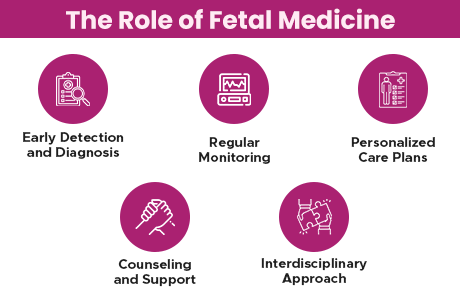
Explore The Importance of Fetal Medicine
When parents are expecting pregnancy, there are many questions surrounding their heads, especially when they are dealing with high-risk pregnancies. As prenatal care is becoming more advanced, the focus has shifted towards early detection and intervention of potential issues that could affect the health of the mother or baby. Here, the role of fetal medicine becomes important because it includes a range of specialized services designed to monitor and enhance the health of both the mother and the developing fetus. In this blog, we will explore the importance of fetal medicine, the conditions it can address, and its role in ensuring a healthy pregnancy.
The Role of Fetal Medicine
Fetal medicine is essential for managing and preventing complications during pregnancy. It plays an important role in ensuring a healthy pregnancy through various means:
Early Detection and Diagnosis: One of the primary functions of fetal medicine is the early detection and diagnosis of potential issues. Through advanced imaging techniques and diagnostic tests, fetal medicine specialists can identify and address concerns early, improving the chances of a healthy pregnancy and delivery.
Regular Monitoring: Regular monitoring of the fetus’s development is important in managing a healthy pregnancy. A fetal medicine centre offers various scans in pregnancy, which help determine the health and viability of the fetus. Continuous monitoring ensures that any deviations from normal development are quickly identified and managed.
Personalized Care Plans: Every pregnancy is unique, and fetal medicine specialists develop personalized care plans tailored to the specific needs of the mother and fetus. These plans include regular check-ups, diagnostic tests, and interventions as needed to ensure optimal outcomes.
Counseling and Support: Pregnancy counseling is an integral part of fetal medicine. Expecting parents receive guidance and support throughout their pregnancy journey, helping them understand the implications of diagnostic tests, manage potential risks, and make informed decisions about their care.
Interdisciplinary Approach: Fetal medicine often involves a collaborative approach, bringing together obstetricians, genetic counselors, pediatricians, and other specialists to provide comprehensive care. This interdisciplinary approach ensures that all aspects of maternal and fetal health are addressed.
Conditions Managed by Fetal Medicine Specialist
Fetal medicine specialist can address a variety of conditions that may arise during pregnancy. Some of these include:
Chromosomal and Genetic Disorders: Fetal medicine specialists through precise ultrasound scans, advanced screening and diagnostic tests helps in detection of chromosomal and genetic disorders. They work in association with Geneticists to assess the risk of inherited conditions and provide information about various testing options.
Fetal Anomalies: Fetal anomalies or birth defects can be detected through detailed ultrasounds and other diagnostic tests. Early detection allows for better management and planning, ensuring that appropriate medical care is available immediately after birth, if necessary.
Growth Restrictions: Intrauterine growth restriction (IUGR) is a condition where the fetus does not grow as expected. Fetal medicine specialists monitor the growth to manage and mitigate risks associated with IUGR.
Multiple Pregnancies: Pregnancies involving twins or multiples require specialized care to monitor the health of each fetus. Fetal medicine specialists are trained to manage the complexities of multiple pregnancies, ensuring that both the mother and babies receive the best possible care.
Pregnancy Complications: Conditions such as preeclampsia, gestational diabetes, and placental abnormalities can pose significant risks during pregnancy. Fetal medicine centres provide comprehensive monitoring and management of these conditions to ensure the health and safety of both mother and baby.
How Garbh Can Help
From early detection and diagnosis to comprehensive monitoring and personalized care, fetal medicine ensures that both the mother and baby receive the best possible care throughout the pregnancy journey. At Garbh, our dedicated team of specialists is committed to monitoring the health of both mother and baby before, during, and after pregnancy. With our advanced facilities and expertise, we provide comprehensive care that ensures the best outcomes for expecting parents. If you are looking for a reliable fetal medicine centre, Garbh is here to support you every step of the way. Contact us today at +91 7087204818 to book an appointment with us.
FAQs
What is fetal medicine?
Ans. Fetal medicine is a specialized branch of medicine focused on monitoring and managing the health of the mother and fetus during pregnancy.
What conditions can fetal medicine treat?
Ans. Fetal medicine can address chromosomal and genetic disorders, fetal anomalies, growth restrictions, multiple pregnancies, and pregnancy complications such as preeclampsia and gestational diabetes.
Why is genetic counseling important during pregnancy?
Ans. Genetic counseling pregnancy helps assess the risk of inherited conditions and provides information about genetic testing options, aiding in early detection and management of genetic disorders.
What is a viability scan in pregnancy?
Ans. A viability scan is an early ultrasound that helps determine the health and viability of the fetus in the early stages of pregnancy.
How does fetal medicine ensure a healthy pregnancy?
Ans. Fetal medicine ensures a healthy pregnancy through early detection and diagnosis, comprehensive monitoring, personalized care plans, counseling, and an interdisciplinary approach involving various specialists.

